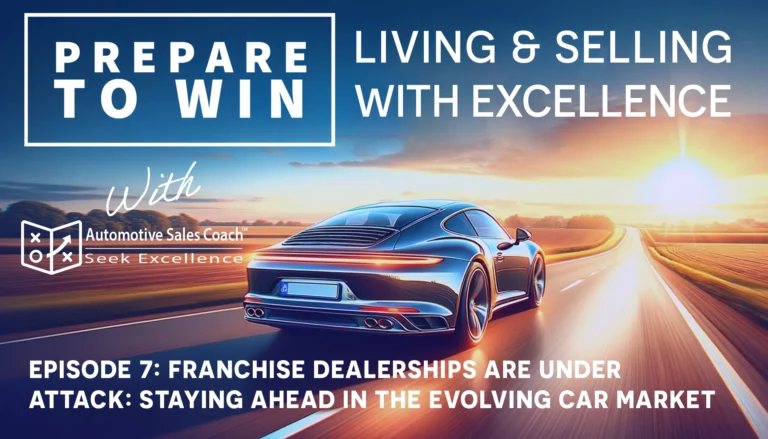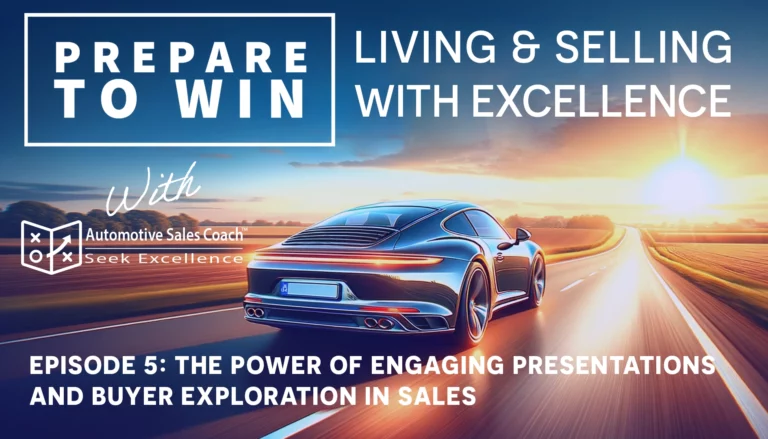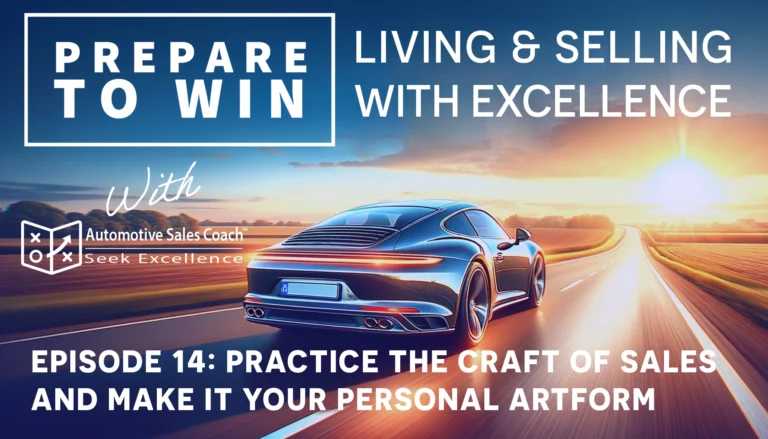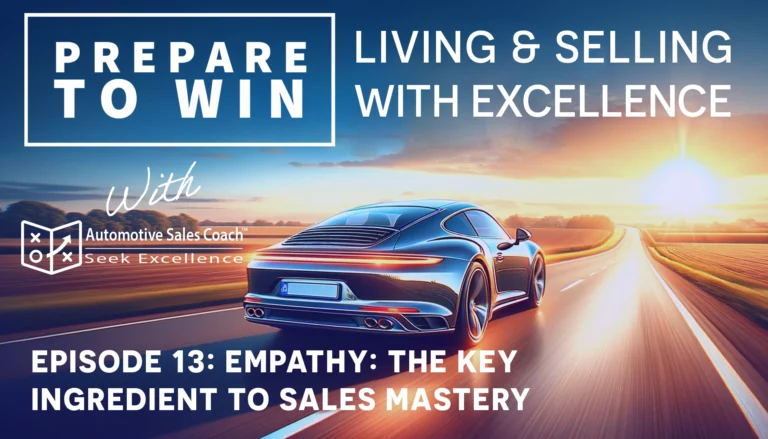Discover the secrets to overcoming trade-in value objections and close with confidence. Grace and I pull back the curtain on the psychological factors that cause customers to cling to inflated vehicle values and provide sales professionals with an array of strategies to navigate these choppy waters. As we dissect the often-misunderstood interplay between perceived and real trade values, you’ll gain a deeper understanding of how to assess trade-ins holistically, taking into account aspects like tax advantages and reconditioning costs. This episode is packed with anecdotes and analogies that will reshape the way you communicate with buyers, ensuring both parties drive away from the deal satisfied.
We tackle the reasons behind the disconnection between what customers think their trade is worth and the realities of market value, equipping you with the narrative skills to shift perceptions and highlight the true value of their trade. You’ll find out how a well-prepared response can be a game-changer in closing sales and delivering an exceptional customer experience. Transform your approach to trade-in objections and accelerate your journey toward mastering the automotive sales landscape.
David Lowe: 0:00
I want more for my trade. Right, right, common objection Sales. People are hearing it every day. Today, we’re going to talk about how to overcome it and close with confidence. Stay tuned.
Grace Lupoi: 0:21
Hi, I’m Grace and I’m here with David Lowe, the automotive sales coach, and, like you said, we’re talking today about how do I overcome that trade objection right, yeah. Yeah. So it’s pretty powerful and really a common objection that we get what’s one step that we can use that’s really going to help us.
David Lowe: 0:34
So isn’t it funny. I think we all want more for our car than the market says is worth. I think I want more for everything that I own than I can get for right Now. The market decides what things are worth, but we all have these attitudes or feelings, don’t we, on what things are worth, that’s right.
David Lowe: 0:52
And we always overvalue the things that we have right, and so it’s not uncommon. Now we’re talking specifically now to automotive salespeople today, and our podcast and the episodes are dedicated to seeking excellence in our life. And maybe you don’t sell cars and maybe you think today’s podcast and roll, but I think it is, because we’re going to talk about communication, right, proper communication, empathy and logic and using stories to help buyers see concepts, to help others see concepts and take action. That’s what selling is Persuade people the merits or benefits of something, right. So we’re going to focus on using this trade because I bet you every one of us has either said it or heard it right I’m not getting enough from my trade, and most salespeople are so unprepared I just don’t get it. They hear it all the time. Okay, so we go into a dealership and I’ll say to the general manager okay, I want four grand more from my trade. How do your salespeople handle that? And typically they say they get up and talk to a manager and I say, well, is that what you want them to do? Well, no, every time they get up, of course, right, so if there’s a better plan, would you want them to have it? And there is a better plan. That’s what we’re going to share with today.
David Lowe: 2:15
This is an amazing one. I said the other day to a manager I want 4,000 more for my trade. What are your salesmen saying? Here’s what he said. There’s the door. I’ve never heard that one before, but it’s so true that I think salespeople are under the misnomer that their job isn’t to help correct their buyer’s thinking. All buyers want to pay less than it takes to buy what they want to buy. All buyers that have a trade want more for it than the market’s sentence worth, and all buyers are always surprised by how big the payment is. Right. Three things we know. Now, when we’re not talking about the other we’re not going to talk about that trade-in. Now, how come they want more? Well, it’s always been. If I owe 20 grand, guess how much I want for my trade.
Grace Lupoi: 2:58
At least 20 grand.
David Lowe: 2:59
If I owe more than the market, I always think my car is worth what I owe. If I owe a dollar, I never ask for a dollar. That’s one of those things, right. So maybe payoffs drive that right. Maybe shopping around, they see what other people are asking for cars like theirs? There’s so much information online. People go out online and there’s bad information online. Sometimes they misclassify the car’s condition. There’s a lot of reasons, but these are feelings, they’re emotions. Right, I want, and what happens if we can’t change the feeling?
David Lowe: 3:39
So we said that our sales process, everything we do, is to help our buyers think differently. We want to think differently about us as salespeople, about buying a car, about pricing, about everything really. Because if our thinking drives our actions and our actions create results, our buyers’ thinking drives their actions. So we want our buyer to leave here satisfied. They came for a new life. Hi, I’ve got this life here and I want this life here. Right, I don’t want to leave it in the old life. They came to leave that life behind. It’s my job to help them find a way to say yes to the life that they want. And we know we’re talking about a car as a lifestyle. We know that we don’t sell steel. We sell lifestyles how that car fits their family, their work and their play, and so my ability to help them reshape their thinking on the trade is so important.
Grace Lupoi: 4:33
So important.
David Lowe: 4:33
If I don’t do it, they leave in their old life. They’re disappointed, they’re not happy. Ok, and now I have to do it in a way. If they say yes, that they feel comfortable with so much sales train you have out there, is really negative, reinforced and pressure driven. There’s some even new sales trainers. They’re always I’d give you more if your car wasn’t such crap. Now they don’t say those exact words, but they might as well. It’s an attitude thing. They’re like the 180-pound sixth grade are on the playground right. What a horrible way to sell and to live and to be treated as a buyer. We should be more like a skilled surgeon. Ok, so we have a plan, don’t we? We know what’s going to happen. We train our salespeople. What’s going to happen? Don’t be surprised. People are going to say what I want more from my trade. Some people are testers, some are negotiators. That’s a different episode, but today we’re going to walk through and the first thing is, since we know it’s a feeling, what’s the first thing we do? I want more from my trade.
Grace Lupoi: 5:33
I totally understand.
David Lowe: 5:35
You meet me with what.
Grace Lupoi: 5:36
Empathy.
David Lowe: 5:38
You meet a feeling with a. What A feeling. Right, speak to the heart. I know, right, I’m the same way. We all want more for a car than a market. So does work. This keeps our buyer from feeling that they’re being singled out or taken advantage of. That’s right. There’s what’s called social proof, there’s power in numbers and all of us feel this way. So this is not a episode about empathy. We talk about it over and over and over because it’s the number one neglected skill that salespeople active listening in empathy I could probably put side by side. But empathy, slowing down and absorbing the buyer’s fear. Then we move into logic. We talk to the heart. Now we talk to the mind. Right, logic. How do we come up with these trade numbers anyway?
David Lowe: 6:29
So in the old days it was a manager against a customer and the salesperson played this liaison thing. It was a really crappy game. 80s and 90s, when I started selling, it was part of that. We did it and it was horrible. I’m so glad we’ve advanced beyond that. So it’s really not the manager that decides anyway. What decides what the car is worth.
David Lowe: 6:51
The market, the market. So we tell them the logic story and we tell it in what storytelling is important. Again, this episode was not about storytelling. We’ll get to that. We’ve covered that a little bit. We’ll get to that again. So that’s why we ask you to follow and like this podcast, because you’re going to get valuable sales principles and, by the way, life principles. I think you can equate a lot of these things to just normal life. Empathy and logic can be equated to everything in life. Absorb their feelings and then speak to their logical side. It has to make sense to them. It has to. So we tell them how we price, how we came up with the number on the market price, for the car came from us doing a market study. Right, we call that the computer story. If you’re on our dealership playbook, you know the computer story because we use it all the time.
David Lowe: 7:44
Okay, now, as a part of that computer story, we have this thing called real trade value, and that’s what the focus of today is about, and we’ve got a long way to get to this right. But we want you to know that this is, this doesn’t stand on an island by itself. It’s a part of that resell-re-ask tool, it’s a part of helping the buyer feel better. Right, real trade value what does it mean? Okay, so we know there’s market value, cash value. Back in the 80s and 90s, you would go to Kelly Blue Book and they would have loan trade in, and retail Loan was cash value. In other words, here’s what the bank feel comfortable lending you for this car, because if you don’t pay for it, they could cash out of it. Okay, okay, cash value, market value, cash out of it.
David Lowe: 8:38
Now, if you go to KBB, they call it instant cash offer. It’s still there, instant cash offer. It’s amazing, though people don’t realize when they go to KB be they give you to what number do you want on your trade? Well, how come I trade? Have two values. They say do you want the instant cash value on your car or do you want the trade-in, which also equates private seller? What Now, if it’s worth trade-in, how come KBB won’t write you a check for it? Because it’s not worth that. So we have, throughout time. There’s a cash value in dealership world because ACV, actual cash value, market value. Kbb calls it instant cash offer. That’s what the market study reveals. So what’s the difference between Cash and trade value? Aha, so KBB has on it. You want the cash value, what we’ll write a check for or what we’re gonna tell you? You should tell dealers, you should get for your car.
David Lowe: 9:42
Now, why does it? How do ways? Kbb exists to drive traffic, that’s right, so they could sell information. Why does any website exist? They’re not just hey, this is a consumer Uh service. We’re gonna go ahead and spend millions on making this website for you, just for your benefit. We just want you to be happy. Now they have it there, so people come, so they can sell from it, right, does that make sense? Yeah, so they have to. People gotta want to come, and lot of.
David Lowe: 10:10
There’s that old comic that has, um, you know, convenient lies, and the line is really long and inconvenient truth, and the line is really short. People want to be lied to, right? So tell me more. Tell me it’s worth more than it is. Alright. So we go there and we look at this trade value. What does trade value mean? It’s not cash value. They won’t want to check for it. You know what it represents an algorithm of, maybe, what you should get off of the retail price of the car you’re buying. So, if you’re buying a car and you’re trading this car, here’s what you should get on trade. Now what if the dealer, though, has already discounted their car there?
David Lowe: 10:49
we go See there’s where the problem exists, that that trade in value is assumed to be off a list price or a retail price, maybe even more than a list price, a retail price. So if you go look at KBB for the retail price on this car, what would it be right? So so we have this difference between cash value and trade value. Trade value is not what you shouldn’t get in cash, but possibly what you could get when you trade in your car and when you factor in the cash value Plus the discounts so you’re saying it’s more than just my old car?
Grace Lupoi: 11:21
There’s multiple things. Take it to consider.
David Lowe: 11:23
That’s it. So when we talk about real trade value, we want people to know it’s not just a cash value. You got a factor in any discounts or what Incentives you’ve been given, and if you add those together you come up with what we might call trade value. Does that make?
Grace Lupoi: 11:41
sense.
David Lowe: 11:41
So real trade value, or helping our buyers see they’re getting more for the car than they think, is not just about the cash value. We wanna add in any discounts that we’ve given them up front and incentives to buy. That’s what we might call trade value. But it doesn’t end there, does it? No? So there’s more. When we’re saying to the buyer they want more for the trade, they’re probably getting more than they think. They’re not just getting the market value, they also got the discount which might equal together like a blue book trade. There we go. Now we’re in Indiana. Not all states are this way, but most of them are.
Grace Lupoi: 12:16
There’s a tax credit, that’s right 7% of what my trade in value is. I get back.
David Lowe: 12:22
So if it’s a $20,000 trade, you have a tax benefit of what? $1,400. So really, your trade is 21-4 with the tax credit. In other words, you’d have to sell your car outright for 21-4 in order to equal the same as 20 grand on trade in. Does that make sense? So you’ve got that cash value plus the discounts, right? That kind of equals what we might call blue book, blue book value. And then we’ve got this tax savings. Is that all there is? No, no See, if you trade in your car, do you have to wash it, change the tires, put brake?
David Lowe: 12:59
No, if you resell the car, you’re probably gonna wanna do that or nobody’s gonna wanna buy it. That’s right. So you put your car online. They’re gonna tell you, bring it up to speed. Or people are gonna come look at it and they’re not gonna buy it. Just like your house, you gotta get it ready for sale. You don’t sell it the way you’re living in it. You make it better than you’re living in to sell it. You paint the floorboards that you haven’t thought about for a long time, but when you look at them through a seller’s eye like that needs to be all right.
David Lowe: 13:24
So some of you who has a trade in. If they were gonna sell it to a friend, what would they do? They’d typically bring it up to stuff Tires, brakes, chips, dents, scratches, interior cleaning stuff like that. So by trading the car and do they save all that money? I sure do. So what if a salesman would say, grace, I get it. I know how you feel. I always want more from my car and the market says it’s worth.
David Lowe: 13:50
The cool thing is you know how we came up with the market value. Of course we use our computer story for that. And, grace, you’re getting more than you think. You’re not just getting that cash value, don’t forget. Online we gave you that discount. You put those together. That’s more like a blue book trade. And then, grace, by trading your car and you’re saving another blank percent on taxes. If you add that to go, look how much you’re getting. You still get more than that Because by trading your car and Grace, you don’t have to go through the time, the hassle or the expense to recondition your car. The dealership now owns it. You just give us the keys and walk away right.
David Lowe: 14:29
They take it, we spend two to four cents a mile. That’s plus tires and brakes and big items. Right, you add all those up together and you are what Killing it on your trade. So the next time that you hear I want more for my trade, I want you to think you’re getting more than you think. And now you have got a way to go ahead and take buyers through it. Does that make?
Grace Lupoi: 14:50
sense it does.
David Lowe: 14:51
There’s one last thing I should note that manufacturers know the trade cycle of their buyers. That’s how they adjust product launches, the leasing terms that they have. Manufacturers are pretty smart right, they’re on a cell car, but they know how to market cars and they know how to build them genius like that, and so to get more people to trade their car now they often offer incentives, and these incentives low finance rates or rebates a lot of that is really designed to make it valuable to trade now. Save if you do this now. In other words, it’s okay if your trade is not what you hope for, because you’re also getting this incentive. That’s right. So as salesmen, as master salesmen, we’re not gonna focus on one number. We’re gonna look at the what.
Grace Lupoi: 15:43
Whole package.
David Lowe: 15:44
The whole package and when it comes to the trade, and we’re not just gonna talk about the cash value, we’re gonna talk about the discounts or the adding together the blue book. We’re gonna talk about tax savings, reconditioning savings, and of course we have the incentives design to make it easy for you to say you know what it’s that way I hope to get from my car. But when I add all this up, I’m killing it on my trade. Now, by the way, in the dealership playbook we call what we just did the resell re-ass right, A five step term, as most comfortable negotiating tool on the planet and we wanted to give you kind of a free look into that today, because I know so many salespeople are facing us and I feel bad that nobody’s showed you. Here’s the door and let me talk to my manager.
David Lowe: 16:27
The worst things that you can do, by the way, I saw a lot of when I first year selling cars. I wasn’t trained, so when somebody said I want more for my choice, let me go talk to my boss. I didn’t know and I sold cars and made money. That doesn’t mean I did it right or did it well when I learned that it’s my job to adjust how my buyer feels about their trade number. My sales went up, my income went up, my customers were happier, everybody was happier, and that’s what we’re after. Okay, so today’s episode what’s it about? You’re gonna hear objections, should you be prepared.
Grace Lupoi: 17:01
Absolutely.
David Lowe: 17:02
Can you be prepared? You ever. Every objection’s been heard before and if it’s gonna happen, don’t you owe it to yourself to prepare. So this prepare to win means prepare for the common objections. If you were a football team, you’d be preparing for the Blitz, right. You’d be preparing for what you know the defense is gonna do. We’re salespeople. We know that buyers have price objections. One of them is the trade, and now you’re more prepared than you used to be, and that’s a benefit of joining the Prepare to Win podcast. So like us and follow us, and I’m David Lowe The Automotive Sales Coach, with Grace Lupoi, and we wanna thank you for being with us. We wanna tell you good selling and seek excellence this week. Be better today than you were yesterday.







